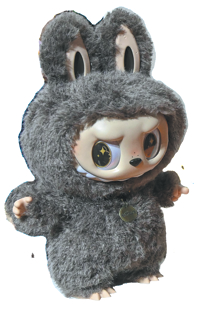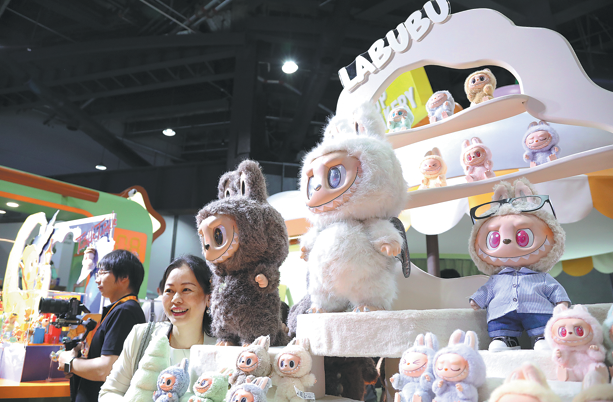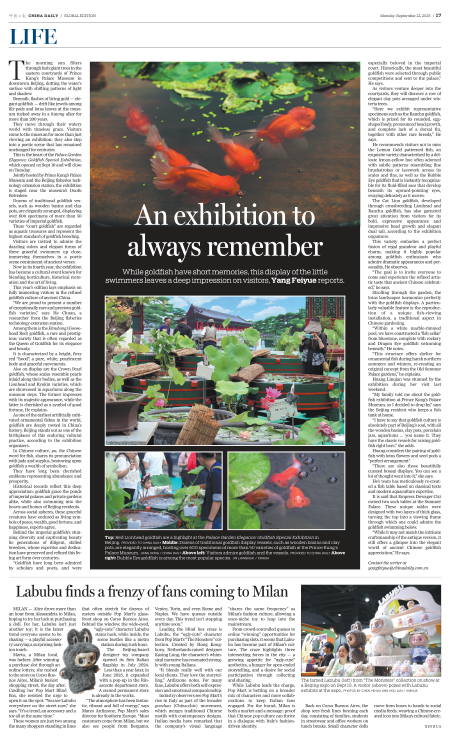
The famed Labubu from "The Monsters" collection on show at a Beijing expo on Sept 10.

The famed Labubu from "The Monsters" collection on show at a Beijing expo on Sept 10. A visitor poses with Labubu exhibits at the expo.
MILAN — Alice drove more than an hour from Alessandria to Milan, hoping to try her luck at purchasing a doll. For her, Labubu isn't just another toy; it is the latest trend everyone seems to be chasing — a playful accessory carrying a surprising fashion touch.
Marta, a Milan local, was luckier. After winning a purchase slot through an online lottery, she rushed to the store on Corso Buenos Aires, Milan's busiest shopping street, the day after. Cradling her Pop Mart Blind Box, she resisted the urge to open it on the spot. "You see Labubu everywhere on the street now," she says. "It's a trend, an accessory and a toy all at the same time."
These women are just two among the many shoppers standing in lines that often stretch for dozens of meters outside Pop Mart's glass-front shop on Corso Buenos Aires. Behind the window, the wide-eyed, "ugly-cute" character Labubu stares back, while inside, the scene bustles like a metro station during rush hour.
The Beijing-based designer toy company opened its first Italian flagship in July 2024.Less than a year later, in June 2025, it expanded with a pop-up in the Rinascente department store. A second permanent store is already in the works.
"The atmosphere has been fantastic, vibrant and full of energy," says Marco Ardizzone, Pop Mart's sales director for Southern Europe. "Most customers come from Milan, but we also see people from Bergamo, Venice, Turin, and even Rome and Naples. We have queues outside every day. This trend isn't stopping anytime soon."
Leading the blind box craze is Labubu, the "ugly-cute" character from Pop Mart's "The Monsters" collection. Created by Hong Kong-born, Netherlands-raised designer Kasing Lung, the character's whimsical narrative has resonated strongly with young Italians.
"It blends really well with our local clients. They love the storytelling," Ardizzone notes. For many fans, Labubu offers both self-expression and emotional companionship.
Industry observers see Pop Mart's rise in Italy as part of the broader guochao (China-chic) movement, which merges traditional Chinese motifs with contemporary designs. Italian media have remarked that the company's visual language "shares the same frequency" as Milan's fashion culture, allowing a once-niche toy to leap into the mainstream.
From crowd-controlled queues to online "winning" opportunities for purchasing slots, it seems that Labubu has become part of Milan's culture. The craze highlights three intersecting forces in the city — a growing appetite for "ugly-cute "aesthetics, a hunger for open-ended storytelling, and a desire for social participation through collecting and sharing.
While Labubu leads the charge, Pop Mart is betting on a broader mix of characters and more collaborations to keep Italian fans engaged. For the brand, Milan is both a market and a message: proof that Chinese pop culture can thrive in a dialogue with Italy's fashion-driven identity.
Back on Corso Buenos Aires, the shop sees fresh lines forming each day, consisting of families, students in streetwear and office workers on lunch breaks. Small character dolls move from boxes to hands to social media feeds, weaving a Chinese-created icon into Milan's cultural fabric.

